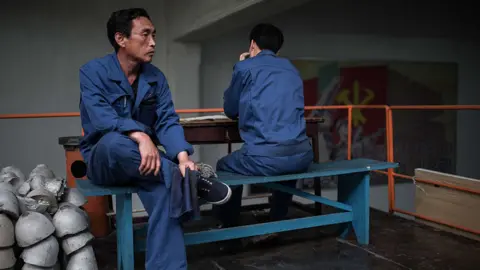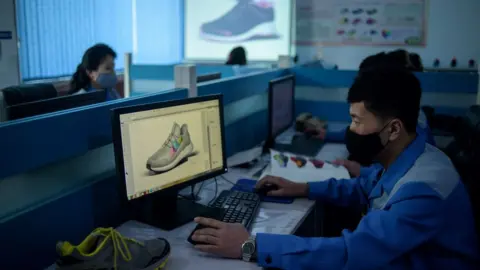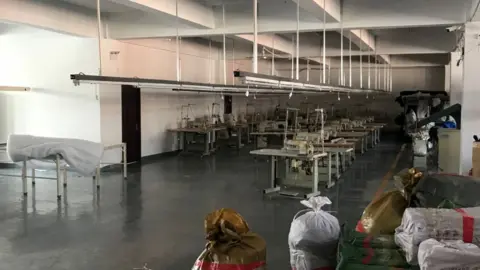North Koreans working in China 'exploited like slaves'
 Getty Images
Getty ImagesLast month, reports emerged that North Koreans working in China had rioted, after finding out they would not be paid, and that their wages had instead been put towards building weapons for Pyongyang.
Instances of North Koreans protesting are virtually unheard of, as the state exercises near total control over its citizens, and public dissent can result in execution.
The reported riots, though unconfirmed, have sparked concern for the wellbeing of the tens of thousands of North Koreans working overseas, earning money for the cash-starved regime.
The BBC has spoken to a former North Korean worker in China who claimed those working in some poorly performing companies had their wages withheld.
We have also seen correspondence from someone claiming to be a current IT worker, who alleges they are being "exploited like slaves".
The riots broke out across several North Korean-run clothing factories in north-east China on 11 January, according to a former North Korean diplomat with sources in the region, who broke the news to media last month.
Ko Young Hwan, who defected to South Korea in the 1990s, told the BBC he heard the workers exploded when they learnt that years' worth of unpaid wages had been transferred to a war preparation fund in Pyongyang.
"They got violent, and started breaking sewing machines and kitchen utensils," Mr Ko said. "Some even locked the North Korean officials in a room and assaulted them."
The BBC cannot verify Mr Ko's account of these protests, as no independently verifiable information is available. Not only is North Korea highly secretive, but its factories in China are closely guarded.
An estimated 100,000 North Koreans are posted abroad, mostly in factories and construction sites in north-east China, operated by the North Korean government, where they earn valuable foreign currency for the sanctions-hit regime. It is estimated they earned Pyongyang $740m (£586m) between 2017 and 2023.
Most of their earnings are transferred directly to the state. But Mr Ko understands that during the pandemic the textile workers at the striking factories had their wages withheld altogether and were told they would be paid upon their return to North Korea.
 Getty Images
Getty ImagesTypically, workers spend three years overseas, but North Korea's strict Covid border closures mean some have now been trapped out of the country for up to seven years.
Discontent started brewing last autumn, Mr Ko claims, when Pyongyang loosened its border restrictions and started letting people back. Some workers were pushing to return home to recoup their money. When they found out they would not be receiving it, they erupted, he said.
A similar version of events was shared by Cho Han-beom, a senior researcher at the South Korean government-funded think tank, Korea Institute for National Unification (KINU), who also cited sources in China. He believes as many as 2,500 workers took part in the dispute, from 15 factories in Jilin province, which would make this the largest known protest in North Korea's history.
While the protests cannot be independently confirmed, we know there are tens of thousands of North Korean workers overseas who have been shut out of the country, and who have had at least part of their earnings withheld.
"A lot of these workers will be psychologically and physically exhausted after working overseas for so long without being paid, and will want to go home," Mr Cho said.
The BBC has spoken to a North Korean who worked in China between 2017 and 2021, who shed further light on the situation of employees overseas. "Jung", who we are not naming for security reasons, said he was one of the best-performing employees at one of the more lucrative companies. This meant he enjoyed what he called "favourable conditions".
Even so, Jung said he had received just 15% of his total earnings, while the rest went to his managers and towards state projects, which frustrated him. While Jung was paid monthly, he claims those at poorly performing companies increasingly had their wages withheld.
"Some people didn't receive heating in their accommodation over the harsh winter months, and they couldn't leave their compound at all, not even to shop for necessities," he said. Jung was allowed to make one trip outside a week, accompanied by others, but during Covid even this little freedom was removed, he said, and he was not allowed to leave his workplace for a year.
Despite the restrictions, overseas jobs are highly competitive among North Koreans because they can pay more than 10 times the amount one might earn inside the country.
Those who apply are thoroughly vetted, to check there is no history of crime or defection in their families. The chosen workers must then leave their families behind, to dissuade them from escaping.
The BBC has been shown an email from someone claiming to be a North Korean currently working in China, which suggests the level of control exerted on workers has increased over the past four years.
The man, who says he is an IT worker in north-eastern China, had been emailing Mr Ko for more than a year, and contacted him again last week after hearing about the protests, Mr Ko said.
 Getty Images
Getty ImagesMr Ko told us he had confirmed the man's identity, though the BBC cannot independently verify who he is, or his account, because of the level of anonymity required to protect him.
"The North Korean state exploits IT workers like slaves, making us work six days a week, 12-14 hours a day," the computer programmer wrote. The staff work through the night for clients based in the US and Europe, he said, which is causing chronic sleep deprivation and many illnesses.
When he first arrived, he was paid between 15-20% of his earnings monthly, but in 2020 he claimed his payments stopped. An order then came down from the authorities in Pyongyang, he alleged, ordering officials to padlock the workers into their camp at night to stop them escaping.
The man detailed in his email how managers are pressured to publicly shame underperforming staff, by slapping them in front of everyone, and later beating them until they bled.
In contrast, he said the high achievers are rewarded with a trip to a North Korean restaurant, where they can pick one of the waitresses to spend the evening with. The top employee of the month gets to choose first. He likened it to a hostess bar - and accused managers of "preying on young men's sexual urges, to get them to compete and bring in more money".
The former overseas worker, Jung, claimed these outings also took place at his company, adding that they had became more frequent during the Covid period "as the workers were trapped indoors and extremely stressed". The men would stay late at the restaurant and the women would be compensated, he said.
Hanna Song, the executive director of the Database Centre for North Korean Human Rights (NKDB), said that typically overseas workers have put up with harsh conditions and strict surveillance because they can return home with a small amount of cash. "Many of them felt abandoned when the government closed the borders during Covid," she said.
Ms Song also confirmed she had heard of instances of wages being withheld, even before the pandemic.
Despite the apparent frustrations among workers, Pyongyang seems reluctant to bring them home. In 2017 the UN Security Council banned North Korea from stationing workers overseas and ordered all countries to repatriate them by the end of 2019.
It is thought China would be unwilling to openly violate these sanctions by accepting a fresh tranche of workers. This leaves North Korea with a conundrum - to figure out how to manage potential unrest as it stops its workers returning.
 Getty Images
Getty ImagesAfter the protests broke out, says Mr Ko, Pyongyang sent its officials in China to the factories to pay the workers part of their missing wages, but millions of dollars were still unpaid.
While it is highly possible the reports of full-scale riots have been exaggerated, most analysts the BBC spoke to agreed it likely that some sort of incident had taken place.
The South Korean intelligence service told the BBC there had been "multiple incidents" involving North Korean workers abroad, resulting from "poor working conditions" and said it was "monitoring the situation".
Ms Song said it was difficult to imagine a large-scale protest could suddenly erupt. "If there had even been a whiff of planning, it would likely have been discovered beforehand by the state security officials and shut down."
Peter Ward, an expert in the North Korean political economy at the Sejong Institute in Seoul, said it was hard to know whether the reports were credible, as no independently verifiable information had emerged, but that given the situation for workers overseas, protests were "entirely plausible".
Though if true, Dr Ward does not believe they pose a direct challenge to the regime.
"This appears to be a labour dispute, these people are not trying to overthrow the government," he said. Instead, he argued they would be further proof that "the North Korean government is really struggling for money, to the point where it is now literally stealing from its workers".
Dr Ward added that North Korea would need to address the issue, not least because it could create tensions with China. Beijing will not want protests on its soil and could decide to stop facilitating these arrangements.
Additional reporting by Leehyun Choi
